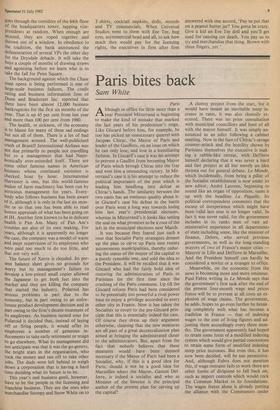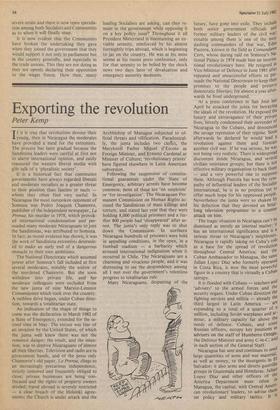Paris bites back
Sam White
Paris Although in office for little more than a year President Mitterrand is beginning to make the kind of mistake that marked the last years of his predecessor's reign. Like Giscard before him, for example, he too has picked an unnecessary quarrel with Jacques Chirac, the Mayor of Paris and leader of the Gaullists, on an issue on which he can only lose, and lose in a humiliating fashion. In Giscard's case it was his attempt to prevent a Gaullist from becoming Mayor of Paris which brough Chirac into the fray and won him a resounding victory. In Mit- terrand's case it is his attempt to reduce the political importance of the post which is leading him headlong into defeat at Chirac's hands. The similarity between the two cases has an ominous quality about it: in Giscard's case his defeat in the battle over Paris went a long way towards losing him last year's presidential elections, whereas in Mitterrand's it looks like setting the seal on what promises to be a rout of the left in the municipal elections next March.
It was because they feared just such a rout that Socialist Party strategists dreamt up the plan to carve up Paris into twenty autonomous municipalities, thereby reduc- ing the status of the mayor of the capital to a purely symoblic one, and sold the idea to the President. It will be recalled that it was Giscard who had the fairly bold idea of restoring the administration of Paris to Parisians for the first time since the crushing of the Paris commune. Up till the Giscard reform Paris had been considered to be potentially too powerful a rival power base to enjoy a privilege accorded to every other city in France. Now it has taken the Socialists to revert to the pre-Giscard prin- ciple that this is essentially indeed the case. Of course they dress up their argument otherwise, claiming that the new measures are all part of a great decentralisation plan aimed at bringing the administrated closer to the administrators. But, apart from the fact that nobody believes that these measures would have been deemed necessary if the Mayor of Paris had been a Socialist, why, if this is a good idea for Paris, should it not be a good idea for Marseilles where the Mayor, Gaston Def- ferre, is indeed a socialist and who as Minister of the Interior is the principal author of the present plan for carving up the capital?
A clumsy project from the start, for it would have meant an inevitable steep in- crease in rates, it was also clumsily ex- ecuted. There was no prior consultation with municipal councillors and least of all with the mayor himself. It was simply an- nounced as an edict following a cabinet meeting. Now in the face of Chirac's savage counter-attack and the hostility shown by Parisians themselves the executive is mak- ing a rabble-like retreat, with Defferre himself declaring that it was never a hard and fast project at all but merely an idea thrown out for general debate. Le Monde, which incidentally, from being a pillar of the Socialist establishment is now under its new editor, Andre Laurens, beginning to sound like an organ of opposition, sums it up with the headline La Pagaille. Its political correspondent comments that the excuse of inexperience which might have been valid last year is no longer valid. In fact it was never valid, for the government includes in its ranks men of vast ad - ministrative experience in all departments of state including some, like the minister of finance, Delors, who served previous governments, as well as the long-standing mayors of two of France's major cities — Mauroy in Lille and Defferre in Marseilles. And the President himself can hardly be considered a novice or a stranger to office.
Meanwhile, on the economic front the news is becoming more and more ominous. Paul Fabra writing in Le Monde says that the government's first task after the end of the present four-month wage and prices freeze will be to prevent at all costs an ex - plosion of wage claims. The government, he adds, hopes to go even further by break- ing completely with what has become a tradition in France — that of indexing wages to the cost of living figures and ad- justing them accordingly every three mon- ths. The government apparently had hoped to retain some form of a modified indexing system which would give partial concessions to retain some form of modified indexing steep price increases. But even this, it has now been decided, will be too permissive. And, although Fabra does not mention this, if wage restraint fails to work there are other forms of dirigisme to fall back on, such as import controls which would rock the Common Market to its foundations. The wages freeze alone is already putting the alliance with the Communists under
severe strain and there is now open specula- tion among both Socialists and Communists as to when it will finally snap.
It is now evident that the Communists have broken the undertaking they gave when they joined the government that they would support it not only in parliament but in the country generally, and especially in the trade unions. This they are not doing as they are openly declaring their opposition to the wages freeze. How then, many leading Socialists are asking, can they re- main in the government while opposing it on a key policy issue? Throughout it all President Mitterrand is maintaining an en- viable serenity, reinforced by his almost fortnightly trips abroad, which is beginning to jar on the country. He was at his most serene at his recent press conference, only for that serenity to be belied by the shock news two days later of devaluation and emergency austerity measures.







































 Previous page
Previous page